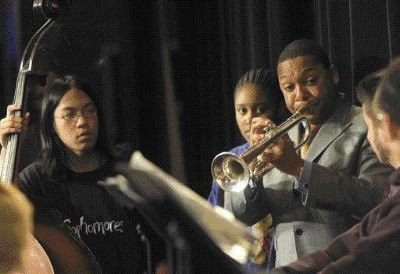A legend offers lessons in jazz and life

(photo: Laurie DeWitt⁄The Gazette)
For 90 minutes, Marsalis, a Grammy- and Pulitzer Prize-winning classical and jazz trumpet player, taught the students on stage and entertained the 100 people in the audience, including band members from Springbrook and Briggs Chaney and White Oak middle schools.
Marsalis has held similar sessions with students across the country, and was at Springbrook in part because of Chad Arrendell, a senior trumpet player in the jazz band whose father is Marsalis’ manager. (Ironically, Arrendell was on a college visit Friday and not in school.)
Marsalis’ overarching message was simple. ‘‘Ultimately, it’s not just about the music. [Music] can help you understand life,” he said shortly after walking on stage in a gray suit, blue shirt and pale orange tie, blowing into his trumpet mouthpiece to warm it up.
The 20-plus-piece jazz band, having itself warmed up before Marsalis arrived, began playing ‘‘It Don’t Mean a Thing If It Ain’t Got That Swing,” one of three songs it played two weeks earlier on its way to second place at a national music festival in Anaheim, Calif. Marsalis walked around the stage looking over students’ shoulders and listening intently as band director Wyman Jones conducted.
Once the music stopped, Marsalis complimented the band and began critiquing ‘‘with love,” as he put it. He first asked who had ever heard Duke Ellington, the leader of the ‘‘greatest band in the history of planet Earth.” Only two students raised their hands.
Listening to and appreciating Ellington was the only way they would be able to play his songs, Marsalis said. ‘‘What chance do you have of speaking French if you’ve never heard it?”
By contrast, all of the jazz band members had written a biography of Marsalis before he came to Springbrook, so they understood the value of his advice, said Dara Wilson, a freshman trumpet player. ‘‘Having a person like that talk to you is very helpful,” she said.
Marsalis then delved into the actual playing of the song, riffing on politics and life as he made his musical points. Swing music, which he called America’s national rhythm akin to the samba in Brazil, reflects American values, he said. The bass and the drums can play their own sound but must respect each other in the context of the whole song, he said, much like Americans can be individuals but must respect each other’s individuality.
‘‘The highest and lowest notes have to be together on every beat, like democracy,” Marsalis said.
When discussing soloing, Marsalis ordered the students to play without looking at sheet music because, he said, a solo comes from inside. ‘‘The most valuable thing you have in life is your perspective,” he said. ‘‘It’s very important to have your own voice.”
For the students, though, the biggest thrill was hearing Marsalis’ musical voice as he played with them. ‘‘It’s one thing to have a classmate play with you. It’s another thing to have Wynton Marsalis,” Wilson said. ‘‘[I did] what many people dream of doing.”
Marsalis played the drums, piano and, of course, trumpet, trying two or three of the students’ ‘‘axes” before finding one he liked. ‘‘Trumpets are temperamental; they only like to play for their owner,” he said to laughter.
Braxton Cook, a sophomore alto saxophone player, performed a solo while Marsalis anchored the rhythm section on the piano. Cook won an award for soloing at the Anaheim festival, but was nervous playing with Marsalis. ‘‘I was so overwhelmed meeting a hero of mine,” Cook said afterward. ‘‘Hearing him play …”
‘‘… You hear him on YouTube, but then to see him in person…” junior tenor saxophone player Joshua Glaser said, almost finishing the thought.
Marsalis wanted to see the brass section play notes with an edge. ‘‘Do-WHOP, Do-WHOP,” he played on Wilson’s trumpet, emphasizing the last note. (‘‘I’m not going to wash my instrument again,” Wilson said afterward.)
‘‘I want you to play hungry,” Marsalis said. ‘‘A lot of people paid a lot of dues to make this music.”
As time wound down, the full jazz band played once more, this time incorporating Marsalis’ instruction as he conducted. Cook and Glaser said they noticed a difference, and indeed the brass section attacked its notes, the rhythm section was balanced, steady and quiet during solos, and the soloists truly improvised.
American music is about talking, and playing music is supposed to feel good, Marsalis had said earlier, and the band was proving both to be true.
Still, Marsalis stopped the song before it finished. The students were expecting more tough love.
‘‘See how that sounded?” Marsalis said. ‘‘Good.”
The audience cheered.
by Danny Jacobs
Source: Gazette.net
